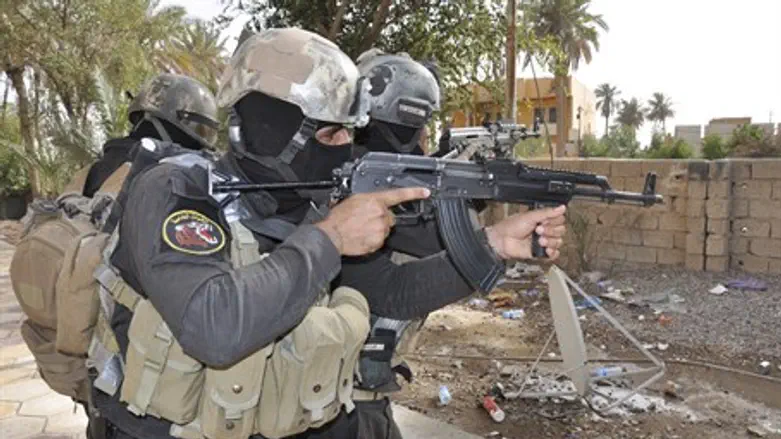
The Al Qaeda-linked Islamic State in Iraq and the Levant (ISIS) has attacked the central Iraqi city of Tikrit, security sources told BBC News Wednesday, less than 48 hours after taking over the northern city of Mosul.
The Islamists have attacked the Turkish embassy there, officials said, and are holding at least 49 people hostage. Reuters reports Wednesday evening that all 49 have been taken to an ISIS hideout and are, allegedly, unharmed; Ankara has vowed to respond if any one of the captives are harmed.
Police officials also told the British Telegraph that the group had freed some 300 inmates in a city prison there and made advances in parts of Kirkuk; local authorities have reported mass beheadings throughout the city.
Tikrit, located in Salaheddin province, is dictator Saddam Hussein's birthplace, and is located just 150 km (95 miles) north of Baghdad.
Reports of Tikrit's takeover surface less than 24 hours after Iraqi parliament speaker Osama al-Nujaifi predicted that the ISIS were turning south - specifically toward the Salaheddin province.
Security sources also told AFP early Wednesday evening that the Islamists have extended beyond Tikrit, now fighting Iraqi forces in Samarra.
Who's to blame? Politicians point fingers at security forces, Maliki
Earlier Wednesday, the governor of Iraq's Nineveh Province held Prime Minister Nouri al-Maliki personally responsible for Mosul's takeover by the ISIS, insisting that the coup is the result of a systemically weak government.
Ethyl Najafi, speaking in a press conference, accused Iraqi military leaders of pulling out of the northern city and giving al-Maliki false reports just hours before the Islamists seized the city. Najafi also demanded that military leaders be put on trial for the failure.
"Military commanders and the Iraqi army in Mosul vanished," he said.
"What happened in Nineveh is a collapse of the Maliki government," Najafi said. "The absence of security and military forces in Mosul made it easier for ISIS and all groups that reject al-Maliki's policy to overtake the city."
Najafi cited previous reports alleging that ISIS has been cooperating with other Sunni militias, as well as unconfirmed rumors that the group is cooperating with the Syrian regime.
Najafi also said civilians in Mosul would form popular committees - or leave - and not look to the Iraqi government for protection.
"Tens of thousands of people fled from Mosul, and there are no accurate statistics for the numbers so far," the governor said. He called for the city's residents to "go back to their business."
In the meantime, he said, he would not conduct talks with ISIS.
"We will hold no talks with the militant group ISIS; we will only kick them out of Mosul," he said.
Refugee crisis
Over 500,000 Mosul natives reportedly fled to Tikrit after Tuesday's takeover in Nineveh province, and hundreds more have flooded into Iraq's Kurdistan region, officials said.
Save the Children’s Acting Country Director in Iraq, Aram Shakaram, stated Wednesday that the refugee crisis in northern Iraq has reached unprecedented proportions.
"As terrified families and children flee violence in Mosul, we are witnessing one of the largest and swiftest mass movements of people in the world in recent memory," Shakaram stated. "This shocking escalation of violence is forcing hundreds of thousands of people to flee for their lives towards the Kurdistan region."
Shakaram noted that transportation has become a serious issue over the past several days, worsening the humanitarian crisis.
"Massive traffic jams and blocked roads are seriously hindering access and movement of aid, as hundreds of thousands flee from the raging violence and chaos," he said. "The most vulnerable families are those left behind and it’s extremely difficult to reach them right now as the violence continues. We are also extremely concerned over how the Kurdistan region of Iraq will cope with the influx."
Takeover snowballing
ISIS, which also seized an international airport and captured US-made weapons and equipment during its rout of Iraqi security forces, has dealt a spectacular blow to Baghdad's Shia-led government by cementing its effective control over the entirety of the country's western Nineveh Province, and now poses a clear threat across the Middle East.
In a desperate attempt to fend off the threat posed by the group - who will now surely be eyeing further territorial gains - Iraqi Prime Minister Nouri al-Maliki called a state of emergency and has offered to arm local tribes and citizens opposed to ISIS. World leaders have also reacted with alarm to the news.
The ISIS has already controlled the Iraqi city of Fallujah for five months, and has also led one of the strongest rebel movements fighting Syrian President Bashar Assad in Syria.
